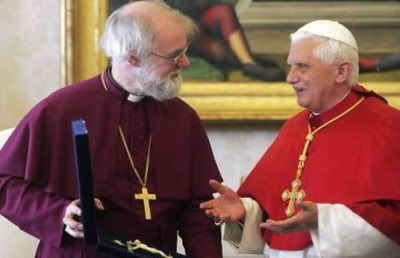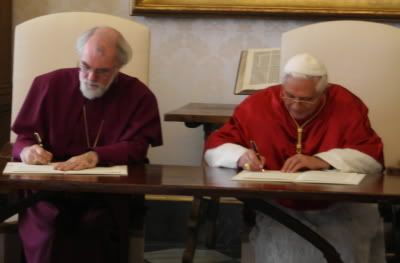
The Times of London made headlines elsewhere today with its front page headline "Churches back plan to unite under Pope." Religion correspondent Ruth Glendhill reported:
Radical proposals to reunite Anglicans with the Roman Catholic Church under the leadership of the Pope are to be published this year, The Times has learnt. . . .
The latest Anglican-Catholic report could hardly come at a more sensitive time. It has been drawn up by the International Anglican-Roman Catholic Commission for Unity and Mission, which is chaired by the Right Rev David Beetge, an Anglican bishop from South Africa, and the Most Rev John Bathersby, the Catholic Archbishop of Brisbane, Australia.
The commission was set up in 2000 by the former Archbishop of Canterbury, Lord Carey of Clifton, and Cardinal Edward Cassidy, then head of the Vatican’s Council for Christian Unity. Its aim was to find a way of moving towards unity through “common life and mission”. The document leaked to The Times is the commission’s first statement, Growing Together in Unity and Mission. The report acknowledges the “imperfect communion” between the two churches but says that there is enough common ground to make its “call for action” about the Pope and other issues.
In one significant passage the report notes: “The Roman Catholic Church teaches that the ministry of the Bishop of Rome [the Pope] as universal primate is in accordance with Christ’s will for the Church and an essential element of maintaining it in unity and truth.” Anglicans rejected the Bishop of Rome as universal primate in the 16th century. Today, however, some Anglicans are beginning to see the potential value of a ministry of universal primacy, which would be exercised by the Bishop of Rome, as a sign and focus of unity within a reunited Church.
In another paragraph the report goes even further: “We urge Anglicans and Roman Catholics to explore together how the ministry of the Bishop of Rome might be offered and received in order to assist our Communions to grow towards full, ecclesial communion.”
The story was noticed by the Anglican-Roman Catholic International Commission, which issued an immediate response explaining that the new document is yet to be debated and received by the respective churches and should be viewed in the context of the 35 year dialogue between Anglicans and Roman Catholics. They rightly observed, "It is unfortunate that its contents have been prematurely reported in a way which misrepresents its intentions and sensationalises its conclusions."
We should remember that organic visible unity of the Roman and Anglican communions has been the stated goal from the begining of the dialogue. It is significant that the latest ARCIC document would report that the time for talking has run its course and a call for action is now appropriate. There also is often a serious disconnect between what church leaders talk about and what the average person in the pew is aware of and participates in. This will be a challenge to overcome in any plan of action.
I think we have lost some of the imperative in the Ecumenical Movement, a sense of urgency and action that needs to be regained. At the same time, it has been a struggle for the Anglican Communion to remain faithful to the apostolic faith and thus to remain together. As I have noted before, is it not time to consider healing the schism after more than 400 years?
The papal "fisherman's ring" which was given by Pope Paul VI to Archbishop Michael Ramsey (which has been cherished by his successors) was like a promise ring. It was a remider that possibilities do not need to remain intangible. It was an encouragement to keep the hope for full visible unity alive. In the course of our dialogue (and even before), Anglicans have been saying that a "Peter with the Apostles" model of papacy is acceptable to us and is a part of the Lord's will for his Church to be one. The proof (as they say) will be found in the pudding.


Father, go to the Anglican Communion News Service site and you will find a "clarification" indicating the Times article is a "serious exaggeration." Apparently the new report simply summarizes the last thirty years of ARCIC and says little or nothing new. Too bad.
ReplyDeleteI know that this will appeal to some, possibly the conservative faction in TEC and of course many Roman Catholics. But I have to tell you that it scares me. I have fairly recently left the Roman Church and become Episcopal. The reason I left had to do with homosexuality. This tortured me for years before I made the decision to leave. I have nothing but fond memories for the RC church. I grew up in it and went to school in it. But for one in my position it is neither friendly nor nurturing. I was going to have to ask myself certain questions at the altar and if I couldn’t respond with the current teachings of the RC church, I would have to deny myself participation in the Eucharist. I would effectively have had to estrange myself from God to stay as part of the Church. After years of soul searching I came to believe that Jesus would not have asked me to do this. Jesus is love and to deny someone access to him is not. The RC church will also look askance at having women as priests.. My rector is a woman and she is probably one of the finest priests I have ever met. The rules that are put in place by Rome, are just that, rules. Sometimes the rules change and that is the nature of rules. I don’t believe in the infallibility of the Pope. That was just another rule created in 1870 to stop the questioning of the people. The bottom line, is that I am happy where I am and would not like to see it change. I know that the two churches can work together for common humanitarian and spiritual goals, but there are some areas where they will never come back together. I left the RC church because of rules I could no longer live with. Three years ago I tried to take my own life over this. I survived and began to change. I can’t go back. I don’t ask Roman Catholics to believe what I believe. I only ask to be left alone to worship God in my way. I also don’t appreciate being told that I am damned to hell. So if anybody is busily tapping away at the keyboard to do that, please understand that I totally ignore responses like that. I hope that the two Churches can continue doing Gods work, but I really don’t see them coming together under one head. Thank you all for listening.
ReplyDeleteYou make a good point about the individual issues (or the issues of individuals) which will be a part of the process if unity. There will be a lot of problematic exceptions to the ease of reunion (problems of succession, women's ordination, divorced and remarried couples, divergent moral standards).
ReplyDeleteThat's part of the reason that I think the process will need a century or so. Each generation will have to make its own adjustments and live into the process anew. That's why we need action on a long-term kind of strategy. If the call to unity is only seen as immediate, it tends to be viewed as an "all or nothing" solution. Practical concerns tend to push that toward the "nothing" outcome.
We are actually in agreement as to the time frame required for whatever changes may come down the road. But as to the problematic exceptions: “There will be a lot of problematic exceptions to the ease of reunion (problems of succession, women's ordination, divorced and remarried couples, divergent moral standards)”, I really don’t see time healing these differences.
ReplyDeleteHistory teaches that the “genie doesn’t like being put back in the bottle”. Slavery was once condoned. That is gone and hopefully forever. Women were treated as chattel. They had no real rights. They were treated as property. I don’t see women every willingly giving up on hard fought rights. Homosexuality has come out of the closet. The governments of the world are now protecting us. We will not go back into hiding. We will no longer accept the slings and arrows of outrageous fortune.
If there is agreement on these issues, it will be an agreement to be different. Whereas I think that the Anglican Communion could eventually accept this I really don’t see Rome signing on. I do love the Roman Church, I just no longer believe that they love me. Sad, but true.